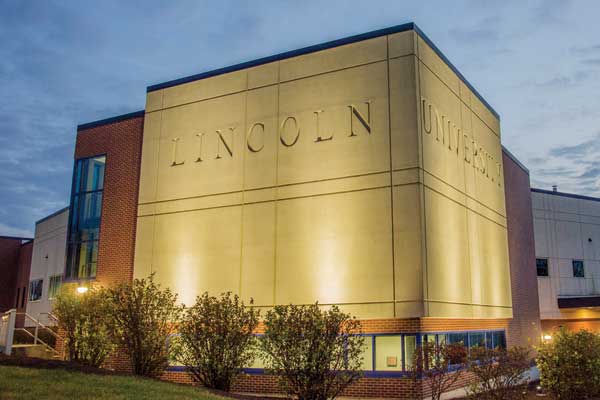
Strategic Themes
- Theme One: Build a Culture that Supports Student Success
Student success at Lincoln University is defined as supporting students to perform well academically; develop holistically (mind, body, and spirit); and successfully advance to graduate school, service or employment. Graduates will leave Lincoln University with the knowledge, attitudes, and competencies needed to be competitive in a global economy and to have a positive impact on their families, their communities, the nation, and the world. HBCUs have a track record of demonstrating that students from all backgrounds can achieve at high levels. Lincoln University will continue its tradition of accepting students of promise and empowering them to achieve their full potential. High academic and social standards, along with outstanding student support, produce student success.
Strategic Objectives:
- Using an inclusive process, develop a values statement for the University that describes values in behavioral terms.
- Connect culture and accountability by defining expectations for both performance and values (behaviors) for everyone associated with the University — including vendors and partners — and holding everyone accountable, every day.
- Design and deliver or procure training and professional development programs that support employees in developing skills that reflect institutional values and behavior (e.g. customer service, communication and collaboration, team building).
- Design reward and recognition programs to bring favorable attention to faculty, staff, students, and administrators whose behavior and performance support student success.
- Theme Two: Enhance Academic Quality and Achieve Operational Excellence
Lincoln University builds upon a glorious past and advances the legacy to "educate for freedom" as envisioned by Horace Mann Bond, the University’s eighth president, in a way that works for the 21st century. The University’s academic and co-curricular programs and services are exceptionally well suited for the students it serves. By focusing on a liberal arts approach featuring high impact practices, investing in areas of strength in the sciences, and investing in faculty growth and development, Lincoln University graduate students who continuously build our reputation. Moreover, Lincoln’s business processes are characterized by operational excellence. The administrative systems, policies, procedures and communication channels work effectively to achieve the mission and vision.
Strategic Objectives:
- Develop a strategic enrollment management plan that incorporates both recruitment and retention goals, clarifies the target undergraduate and graduate populations, and identifies the optimal enrollment size to achieve the University’s academic and financial goals.
- Develop a plan for the University City site in Philadelphia that integrates the University’s strategic and enrollment goals.
- Review curricula and syllabi to ensure that general education and major program courses are tied to institutional learning outcomes and include high impact pedagogies.
- Review and revise, as necessary, academic personnel policies to ensure that faculty hiring, orientation, and tenure and promotion practices support institutional priorities.
- Invest in faculty development and research opportunities.
- Continue to enhance faculty governance and develop leadership potential within the faculty and academic administration.
- Review and revise the performance management system, as necessary, to ensure that employees receive effective and timely feedback on performance.
- Identify operational issues that most hinder progress in achieving the vision, and work collaboratively to resolve these issues using task forces, process redesign, administrative action, policy change or other tactics, as necessary.
- Theme Three: Develop Strategic Partnerships to Leverage Resources and Assets
Through a myriad of strategic partnerships, Lincoln works with local, regional, national and international partners to develop property, conduct research, solve community problems and contribute to the cultural life of the community. The University’s focus on active and collaborative learning using high impact practices is supported by developing partnerships with industry, entrepreneurs, schools, governments, and the non-profit sector. The goal: to create opportunities for students to apply what they are learning in the classroom while experiencing the world. Strategic partnerships like public-private partnerships are helping the University diversify its revenue streams while also providing both educational opportunities for students and products or services for the University and the local community. Strategic partnerships internally between divisions and departments, faculty and staff ease the flow of communication within the University and support a work environment that is collaborative, efficient, and effective.
Strategic Objectives:
- Identify expertise (internally or externally) in designing and implementing public-private partnerships and develop a plan for growth.
- Develop an institutional structure and process for identifying and evaluating potential partnership, sponsorship and engagement opportunities.
- Identify three or more partners to enhance professional school options for Lincoln University students.
- Theme Four: Strategically Align Resources to Support Institutional Priorities
Lincoln University aligns resources with its highest priorities. Strategic spending ensures that every dollar spent supports student success. Organizational structure, policies, procedures, and decision-making processes converge to allocate people, money, and infrastructure toward projects and initiatives that support the vision. The University is a model of stewardship. Lincoln is prudent in its use of every dollar and opportunity provided by the state, alumni, friends and partners. New and reallocated resources support initiatives that enhance the educational experiences of all students. Lincoln constantly identifies business opportunities that generate new dollars for investment.
Strategic Objectives:
- Review and revise the organizational structure to facilitate communication, collaboration and accountability within and among units.
- Diversify revenue sources through entrepreneurial activity, fundraising, and philanthropic support.
- Design and implement a process that integrates planning, budgeting, and assessment.
- Enhance the Institutional Research function and provide professional development to support faculty, staff, students, and administrators in using data to inform decisions.
- Complete a Campus Master Plan that aligns priorities for new construction, facilities renovations, deferred maintenance, and space utilization with academic and strategic goals.
- Increase investments in technology and infrastructure to support the strategic priorities.
- Theme Five: Tell the Lincoln University Story
Lincoln University’s reputation is based upon the quality of its graduates and its history and legacy as an HBCU. Its liberal arts focus promotes social responsibility and global engagement. The University excels not only at producing well-prepared graduates but also at telling its own story. It educates and informs major stakeholders about its accomplishments and successes, which generates goodwill and additional resources to support its vision. Every member of the Lincoln University community understands the vision and mission and tells the story from his or her perspective. The messages that are disseminated are consistent with the University brand and support building its reputation. Telling the Lincoln story builds pride and motivates everyone to do more to achieve results.
Strategic Objectives:
- Develop and implement a strategic marketing and communication plan that is designed to reach and influence all major stakeholder groups, provide greater coherence for the Lincoln University brand and position the University to compete for students, talent, and financial resources.
- Develop strategies for educating and engaging Lincoln students and alumni in telling the story.
- Develop and implement a strategic advancement plan that is designed to engage all major stakeholder groups, create a culture of philanthropy, and position the University for increased philanthropic support and alternative revenue streams.




